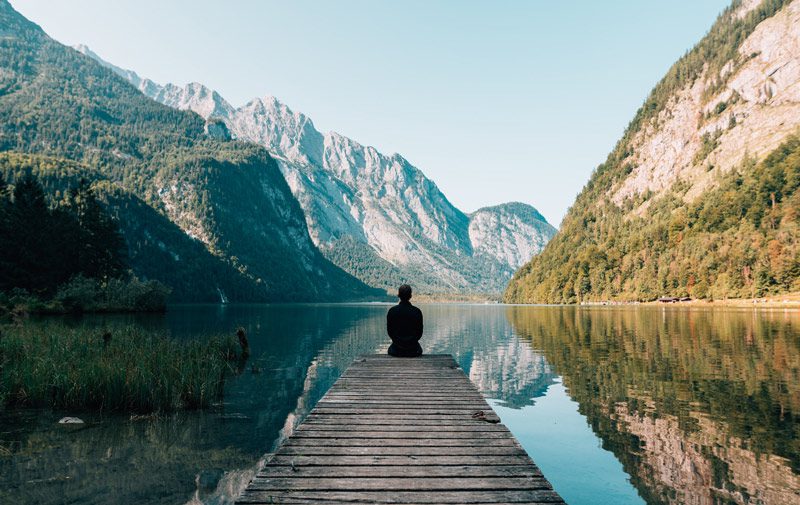Anxiety and depression are real. They continue to plague our society, arguably more so now than in past years. Life is already incredibly challenging. Slap a pandemic and economic turbulence on top of that, and out comes a surge of anxious emotions and depressing thoughts.
Since most of these external events influencing our emotions are out of our control, we must empower ourselves through different daily practices to keep our spirits up. Control what we can control. To strengthen the way we handle stress and anxiety in our lives, we must actively make changes in our lives.
Making big changes sounds scary and uncomfortable. We can completely understand and empathize with that. So, how do you make progress through massive changes? Start with your daily routine, and take it day by day. The daily activities we engage in create our week. Each week comes after the next to form a full month of progress. From there, you’re off the races. By making small changes throughout our daily lives, we compound these good habits over time to make massive progress.
Today, we will review 4 holistic practices that you can implement into your life today to help decrease anxiety, reduce depression, and live optimally.
1.) Gratitude Journal
There is no question that gratitude is a powerful emotional tool. Many health specialists claim that it’s difficult to experience other negative emotions, such as anxiety or anger while expressing gratitude. If you feel like you are in a ‘funk,’ give this holistic practice a try.
You can purchase a journal or notebook for a few dollars, making this holistic strategy very inexpensive. Many people who journal suggest doing this activity when you have complete and clear headspace. In other words, implement this into a part of your daily routine where you aren’t doing something else that requires focus. Journaling about things you’re grateful for would be challenging during a Zoom conference call for work.
Try writing things that you are grateful for either first thing in the morning or right before bed. It helps to write about specific things or people in your life. The more specific you get, the more gratitude you will likely feel.
2.) Breathwork
If you have control over your breath, anxious thoughts that can lead to depression are easier to overcome. Taking a few very deep breaths clears our minds and reminds us that we are alive. It helps calm down the spiraling thoughts of feeling unsafe.
Breathwork not only works on the emotional level, but it also helps your body physically feel better. Increased oxygen flow to the brain and bloodstream helps keep things functioning properly. You can regulate many of your body’s functions by controlling your breath.
If you have experienced rapid heart rate from anxiety or depression, try a few breathwork exercises to help calm down your system. Our bodies like to match the speed of our breath. For example, if we are running a marathon and short of breath, our bodies will kick other functions into gear to help things move at the same levels. The same goes for slowing down our breath. We can calm down other parts of our bodies, including our minds, by practicing holistic breathwork.
3.) Yoga Classes
The first two holistic practices for reducing depression and anxiety can be helpful, but they don’t involve other people. Being around others and interacting in society is a major component of happiness for many people.
Attending a yoga class is a perfect opportunity to get your body moving while interacting with other yoga students. Most types of yoga practice are traditionally considered holistic, with a large focus on the mind-body connection. Certain yoga classes are less strenuous and include more breathwork exercises and light stretches. Other types of yoga are intense. If you’ve ever attended a hot yoga sculpt class, it is essentially a 1-hour vigorous workout in a sauna.
Overall, movement is a huge component of feeling happy in our bodies. We can bridge the gap between our minds and bodies through holistic practices like yoga. It’s difficult to feel anxious while constantly moving and stretching our bodies during a yoga class. Additionally, on the chemical side of things, our bodies release endorphins during many exercises, including yoga.
4.) Meditation
Similar to breathwork, meditating on your own is completely free. If you decide to use specialized meditation apps or attend classes, there can sometimes be a small fee. Regardless of your preference, meditation is a great way to calm your mind down and recenter your focus.
This may be the most difficult holistic practice of these four. It can be hard to sit and focus for extended periods when you have anxious thoughts that can spiral you down an emotional rabbit hole. If this is you, know that there are still plenty of options for you.
Meditation can be as long or as short as you prefer. Even 5 minutes of mediation first thing in the morning can calm your mind down for the day. Meditation typically takes a few rounds to get used to it. Don’t give up if you don’t feel anything the first few times. There are deeper levels of quietness in your mind that you can experience as you practice meditation more frequently. This can be an effective holistic practice for reducing depression and decreasing anxiety.
Conclusion
As challenging as life can feel at times, there are tools out there that we can use to help us feel happier and enhance our emotional well-being. It may not happen overnight. However, you can make significant progress in decreasing depression and anxiety through these four holistic practices. It is up to you to figure out your own preference when it comes to your personal wellness. Don’t be afraid to try out new things that can ultimately help you feel better and live life more optimally.
About the Author: Dr. Kira Capozzolo is a Chiropractor at Twin Waves Wellness Center, a holistic chiropractic office that practices Network Spinal. She opened up her wellness center with her twin sister. Kira enjoys writing about health, wellness, and holistic topics.
Photo by S Migaj on Unsplash
The opinions and views expressed in any guest blog post do not necessarily reflect those of www.rtor.org or its sponsor, Laurel House, Inc. The author and www.rtor.org have no affiliations with any products or services mentioned in the article or linked to therein. Guest Authors may have affiliations to products mentioned or linked to in their author bios.
Recommended for You
- Reclaiming Your Future: Effective Strategies for Addiction Recovery - March 26, 2025
- Coping With Social Anxiety In School: Strategies For Success - March 24, 2025
- Overcoming Trauma and Living with Depression: A Journey of Healing - March 20, 2025





